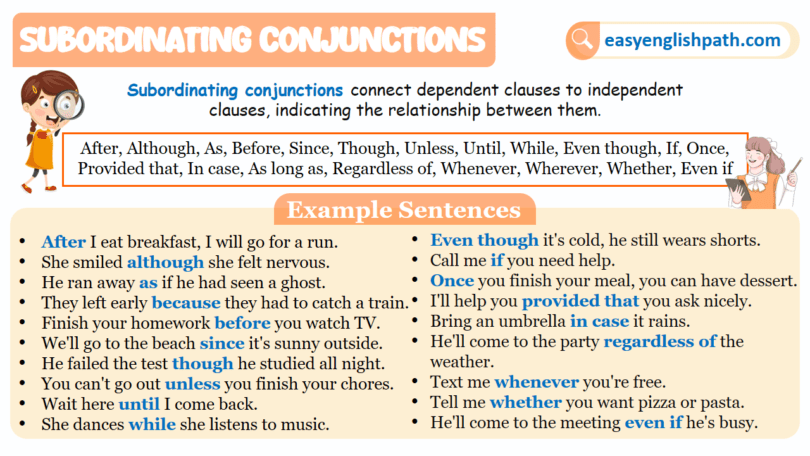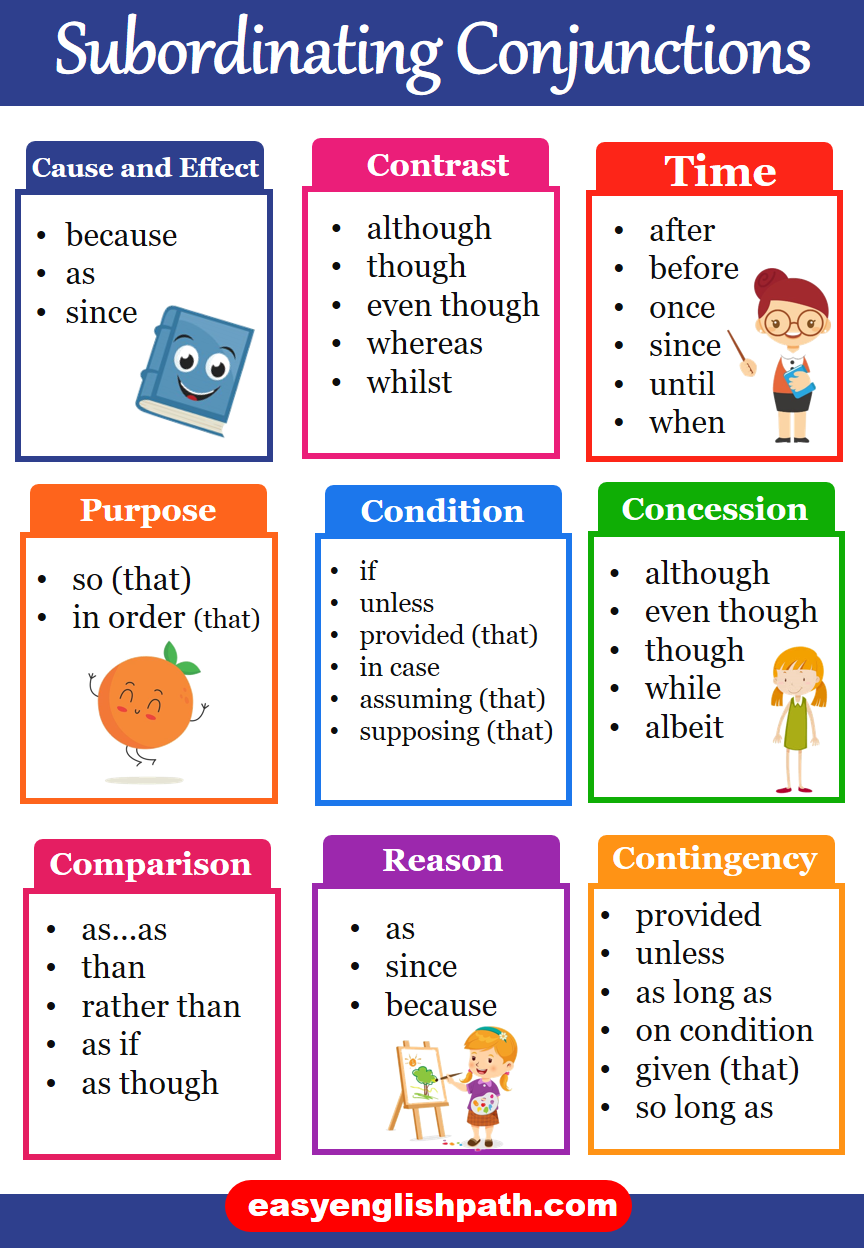Subordinating Conjunctions help us to connect two parts of a sentence. The words like because, although, and when are subordinating conjunctions. They show us how one part of a sentence depends on the other. If we understand how to use these words correctly, we can make our writing clearer and more interesting.
What are Subordinating Conjunctions?
A subordinating conjunction is defined as a word that begins a subordinate clause. Subordinating conjunctions are words that connect dependent clauses to independent clauses. They help us in forming complex sentences.
- She stayed home because she was sick.
- They went hiking although it was raining.
- Call me when you arrive.
- You will pass if you study.
Example Words:
Because, although, since, while, after, before, if
Usage of Subordinating Conjunctions:
- Cause and Effect
- Time
- Condition
- Contrast
- Purpose
- Concession
- Result
- Comparison
1. Cause and Effect:
Cause and effect words help us to express the reason for something happening, because, since, and as.
- They canceled the picnic since it started raining.
- He missed the train as he overslept.
- She failed the exam because she didn’t study.
2. Time:
Time word is used to indicate the timing of events words like after, before, while, since, and when.
- We’ll have dinner when she arrives home.
- They had already left by the time we arrived.
- While I was waiting, he called me.
3. Condition:
Condition word is used to describe conditions like if and unless.
- I’ll buy the dress provided that it fits me.
- If you study hard, you’ll pass the exam.
- She’ll eat dessert if she finishes her dinner.
4. Contrast:
Contrast word is used to to express a contrast between two different clauses such as although, though, and while.
- He is very talented, whereas his brother struggles.
- Though it was cold, they went for a swim.
- She enjoys hiking, while her sister prefers biking.
5. Purpose:
Purpose word is used to indicate the purpose of an action. such as so that and for.
- He left early for he had an important meeting.
- We turned off the lights so that the baby could sleep.
- He took a loan so that he could buy a car.
6. Concession:
Concession is the word that is used to agree to some point. words such as although, though, and even though.
- Even though it was raining, they went for a walk.
- Although she was tired, she kept working.
- He enjoyed the meal, though it wasn’t very spicy.
7. Result:
The result word can be used to describe a result. such as so that, so, and such…that.
- He ran so fast that he won the race.
- She sang so beautifully that everyone applauded.
- The wind was so strong that it blew the roof off.
8. Comparison:
Comparison word helps to create a comparison between two things. such as then and as.
- She is more skilled than her peers.
- He works harder than anyone else.
- She runs as fast as her brother.
Subordinating Conjunctions Rules:
| Cause and Effect | Time | Condition | Contrast | Purpose | Concession | Result | Comparison |
| because | after | if | although | so that | although | so | than |
| since | before | unless | though | in order that | though | such…that | as |
| as | when | provided that | whereas | for | even though | that | as much as |
| while | assuming that | while | whether or not | thereby | rather than | ||
| since | as long as | even though | albeit | consequently | more than | ||
| until | as soon as | nevertheless | regardless | hence | rather | ||
| whenever | unless | even if | albeit | therefore | |||
| meanwhile | whereas | even if | thus | ||||
| whilst | regardless | thereby |
Subordinating Conjunction Examples:
- She left early because it was late.
- He’ll eat when he’s hungry.
- Take a jacket if it’s cold.
- He’s happy while she’s sad.
- He ran fast so that he wouldn’t miss the bus.
- She’s tired although she slept well.
- He smiled when he saw his friends.
- She’s faster than him.
- He’ll come even though he’s busy.
- They’ll go swimming before dinner.
You May Also Like this:






